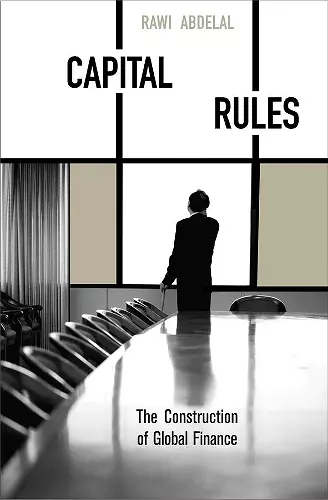Capital Rules
The Construction of Global Finance
Format:Paperback
Publisher:Harvard University Press
Published:30th Oct '09
Currently unavailable, and unfortunately no date known when it will be back

In this era of globalisation, Rawi Abdelal's analysis of the foundations of global financial markets is a valuable contribution towards advancing the cause of global governance. -- Pascal Lamy, Director General of the World Trade Organisation This book addresses one of the most significant shifts in the organization of the international economy--the lowering of national border level controls to the entry and exit of capital--and explains how and why states renounced this powerful lever of national control over their economies. In place of the standard explanations, Abdelal develops a sociological argument about the construction of norms and their spread across institutions. Beautifully and engagingly written with brio and clarity, Capital Rules is a brilliant work that will become a mainstay of political economy literatures. -- Suzanne Berger, Massachusetts Institute of Technology
In this intellectual, legal, and political history of financial globalization, Abdelal argues that European policy makers promoted the liberal rules that compose the international financial architecture, while U.S. policy makers have tended to embrace unilateral, ad hoc globalization.
Listen to a short interview with Rawi AbdelalHost: Chris Gondek | Producer: Heron & Crane
The rise of global financial markets in the last decades of the twentieth century was premised on one fundamental idea: that capital ought to flow across country borders with minimal restriction and regulation. Freedom for capital movements became the new orthodoxy.
In an intellectual, legal, and political history of financial globalization, Rawi Abdelal shows that this was not always the case. Transactions routinely executed by bankers, managers, and investors during the 1990s--trading foreign stocks and bonds, borrowing in foreign currencies--had been illegal in many countries only decades, and sometimes just a year or two, earlier.
How and why did the world shift from an orthodoxy of free capital movements in 1914 to an orthodoxy of capital controls in 1944 and then back again by 1994? How have such standards of appropriate behavior been codified and transmitted internationally? Contrary to conventional accounts, Abdelal argues that neither the U.S. Treasury nor Wall Street bankers have preferred or promoted multilateral, liberal rules for global finance. Instead, European policy makers conceived and promoted the liberal rules that compose the international financial architecture. Whereas U.S. policy makers have tended to embrace unilateral, ad hoc globalization, French and European policy makers have promoted a rule-based, "managed" globalization. This contest over the character of globalization continues today.
In this era of globalisation, Rawi Abdelal's analysis of the foundations of global financial markets is a valuable contribution towards advancing the cause of global governance. -- Pascal Lamy, Director General of the World Trade Organisation
This book addresses one of the most significant shifts in the organization of the international economy--the lowering of national border level controls to the entry and exit of capital--and explains how and why states renounced this powerful lever of national control over their economies. In place of the standard explanations, Abdelal develops a sociological argument about the construction of norms and their spread across institutions. Beautifully and engagingly written with brio and clarity, Capital Rules is a brilliant work that will become a mainstay of political economy literatures. -- Suzanne Berger, Massachusetts Institute of Technology
Drawing on extensive documentary evidence, as well as dozens of interviews with high-level finance officials and midlevels bureaucrats, [Abdelal] tells a fascinating (and largely unknown) tale: how a clutch of French socialists helped to upend economic orthodoxy and lead the charge for lifting restrictions on capital flows within Europe and throughout the world...The book is a mix of accessible political history and counterintuitive insight, bringing to our attention one of the most important, and least appreciated, developments in the postwar global economy. -- Matthew Rees * Wall Street Journal *
Brilliant and authoritative...Abdelal's book is the definitive account of the politics of global financial deregulation--and its increasingly disastrous consequences...This book deserves the widest general audience of serious people. -- Robert Kuttner * American Prospect *
Capital Rules is an engaging description of the history behind changes in capital flow doctrine...Abdelal...accomplishes an excellent and quite thorough treatment of the subject matter. -- Ikee Gardner * Journal of Economic Issues *
Offer[s] original insights into the politics of international financial regulation. -- Tim Büthe * Review of International Organizations *
Rawi Abdelal supplies a valuable historical perspective. He explains that the liberalization of capital markets emerged not from a conspiracy of global financiers or the hegemony of Wall Street, but from a turn towards liberal economics by the French Socialists under François Mitterrand. -- Robert Howse * Harvard Law Review *
- Nominated for Robert Jervis and Paul Schroeder Best Book Award 2007
- Nominated for George Louis Beer Prize 2007
- Nominated for J. David Greenstone Book Prize 2008
- Nominated for Woodrow Wilson Foundation Award 2008
- Nominated for Best Book Award in European Politics and Society 2008
ISBN: 9780674034556
Dimensions: unknown
Weight: unknown
320 pages